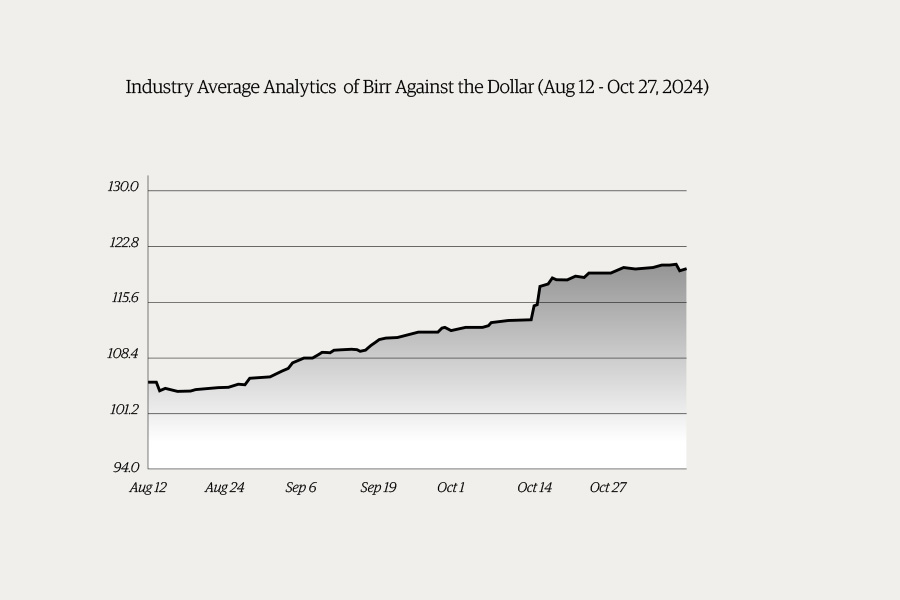
Radar | Oct 28,2023
Sep 14 , 2019
By Daniel Hailu (PhD)
The most urgent task before Ethiopian society is implementing a well-organised, nationwide, multi-stakeholder and comprehensive social reform strategy, writes Daniel Hailu (PhD) (ethiopianmindset@gmail.com), senior child/ social protection consultant and researcher at Litmus Research and Consultancy Plc, curator of (www.ethiopianmindset.com), a website dedicated to a socio-psychological transformation in Ethiopia.
In his Ethiopian New Year address to the nation on the eve of September 11, 2018, Ethiopia’s Prime Minister Abiy Ahmed(PhD) stressed the need to be imbued with a new and transformed mindset as we received the New Year. He asserted that the New Year would not be meaningful if we received it with an old mindset of division, hate, grudges, anger and mistrust.
Distinguished national and international scholars such as Professors Messay Kebede, Jon Abbink, Mesfin Woldemariam and David Kortten among many others have stated that the successful attempt by our obsolete mindset to reassert itself has been one of, or the main cause, of our social, political and economic crisis, however differently each framed and named it. Moreover, a consensus appears to be emerging among dispassionate observers that our obsolete mindset is incompatible with the beliefs, values and norms that need to inform the rapid political and economic reform that Ethiopia is currently undergoing. They warn that the current social and political crisis can escalate into all-out civil war if our dysfunctional mindset is allowed to continue to predominantly structure the thoughts and behaviours of the majority of our elites and the Ethiopian population at large, irrespective of our political affiliation, ethnicity, religion or ideology.
In recognition of this source of a potential national catastrophe, some laudable initiatives like the 'Libona Weker' TV series on Ethiopian television, the mindset lectures by Mihret Debebe (MD) and interviews like those of Mesfin Woldemariam (Prof.) on Sheger FM radio have been directed at mindset transformation. We have just started a blog to do just that.
However, these few siloed initiatives are far from sufficient to transform the collective mindset of a nation. In other words, a national psychological reform strategy as an indispensable element of the overall national reform has not been given systematic attention. One reason for this apparent neglect appears to be the monopoly of attention successfully claimed by the perceived need to reform political and economic institutions.
Initially, the focus was on firefighting the immediate economic and political crisis and instabilities that were besieging the country. Over the past few months, strategies have been concurrently defined toward transforming and stabilising our economy and building democratic institutions. Concrete steps taken in this direction include the adoption of the Home-Grown Economic Reform Strategy and the legal reforms of institutions that govern elections, justice, the media and civil society organisations. Although social reform has been named as the third pillar of the overall reform package by the government, it has not been systematically articulated or translated into a national strategy. More specifically, the transformation of our collective social psychology (which should perhaps be at the core of any social reform strategy) has gone little beyond public events of various scale and motivational speeches by popular figures in public gatherings.
I join those who argue that any gains from the political and economic reforms will not be sustained over the medium to long term without parallel gains in social reform. In particular, gains of political and economic reforms could eventually lose momentum or even backslide without parallel reform in the mental structure of both the elites that propel the reform as well as the rank and file citizens.
Consider liberal democratic governance structures that politicians and activists are keen on grafting onto Ethiopian society. These structures have thrived in the West, because interpersonal, group and institutional relationships in these societies are more or less structured by beliefs, values and norms supportive of democracy. In contrast, in our societies, these same relationships have been structured by patrimonial beliefs, values and norms on which a neo-patrimonial system of government has thrived for centuries. A neo-patrimonial system of governance is one in which behind a façade of bureaucratic governance, those in power at any level of government use state resources in order to secure the loyalty of clients in the general population.
Despite their ideological differences, the past three regimes in Ethiopia have in common neo-patrimonialism as their essential attribute. In his anthropological study “The Dynamics of Provincial Administration in Haile Selassie’s Ethiopia: 1930-1974”, Charles B. Rosen reported that Emperor Haile Selassie introduced bureaucratic administration in 1942 as part of a bid to centralise the administration of the country and break from the autonomy of regional lords. Rules and regulations were passed to institutionalise a bureaucratic administrative system.
However, in the day to day running of the state, the Emperor “made a simultaneous use of his prior personalistic or patrimonial type of administration in which he relied on loyal ‘spies’ on provisional governors and also sustained his role as a final arbitrator in any dispute." The successive regimes have modified or elaborated the administration to maintain the façade of bureaucracy and meet international expectations of the time. Under this façade, however, continued patrimonial values and norms in which the majority of those in authority (clients) acquire political or financial support from patrons in the general public in exchange for some special privileges or benefits.
Underlying our traditional neo-patrimonial governance are three core principles: hierarchy, patriarchy and reciprocity. Although we may have succeeded to cover these principles behind the veil of bureaucratic administration, they more conspicuously structure our traditional institutions such as the family and day to day interpersonal and intergroup interactions. Hierarchy and patriarchy require subordinates and women to demonstrate respect, unreserved obedience, social deference, loyalty and diligence for seniors and men. Reciprocity, on the other hand, requires seniors and men to provide all the material and social security and protection to subordinates and women in return. Similarly, seniors and men are looked up to by juniors and women for such protection. From these principles are generated clientelism as a principal method for organising our society and its institutions. The oppression of one group of people by another that has increasingly resulted from the overt and covert application of these three principles is at the root of much social tension, disruption and displacement we increasingly see in the nation today.
The obsolete mindset is also at the root of the mounting poverty and economic crisis we have been experiencing as a nation. The neo-patrimonial political culture has been facilitating the enrichment of a few at the expense of the entire nation by undermining market competitiveness and distributing rent within cliental networks, among other things. More importantly, several other traits of the collective mindset have discouraged the commitment to transform the economy. These traits include poor work ethic, chronic mistrust in cooperating with others, short-termism, pessimism, mediocrity, devaluation of the economic value of time, predisposition to immediate gratification and poor saving, low risk taking, entrenched resistance to change and zero-sum game belief systems. These economically dysfunctional traits stand in stark contrast with social psychological drivers of economic growth observed in middle- and high-income countries such as emphasis on hard work, deferring gratification, functional interpersonal trust to engage in joint ventures, willingness to cooperate with others, valuation of time, risk taking, openness to change, persistence, attention to details, rigorousness and celebration of individual achievement.
Therefore, the most urgent task before the Ethiopian society is implementing a well-organized, nationwide, multi-stakeholder and comprehensive social reform strategy. The core objective should be promoting a social psychological movement aimed at transforming the obsolete elements of the collective mindset and replacing them with those that recognise and facilitate the equality and prosperity of all Ethiopians irrespective of age, gender, ethnicity, economic and social status.
PUBLISHED ON
Sep 14,2019 [ VOL
20 , NO
1011]


Radar | Oct 28,2023

My Opinion | Oct 21,2023

Radar | Jul 13,2025

Covid-19 | May 16,2020

Viewpoints | Apr 26,2025

Viewpoints | May 27,2023

Editorial | Jul 05,2025

Money Market Watch | Nov 09,2024

Fortune News | Sep 06,2020

Commentaries | Sep 04,2021

Photo Gallery | 178296 Views | May 06,2019

Photo Gallery | 168501 Views | Apr 26,2019

Photo Gallery | 159281 Views | Oct 06,2021

My Opinion | 137061 Views | Aug 14,2021
Commentaries | Oct 25,2025

Dec 22 , 2024 . By TIZITA SHEWAFERAW
Charged with transforming colossal state-owned enterprises into modern and competitiv...

Aug 18 , 2024 . By AKSAH ITALO
Although predictable Yonas Zerihun's job in the ride-hailing service is not immune to...

Jul 28 , 2024 . By TIZITA SHEWAFERAW
Unhabitual, perhaps too many, Samuel Gebreyohannes, 38, used to occasionally enjoy a couple of beers at breakfast. However, he recently swit...

Jul 13 , 2024 . By AKSAH ITALO
Investors who rely on tractors, trucks, and field vehicles for commuting, transporting commodities, and f...

Oct 25 , 2025
The regulatory machinery is on overdrive. In only two years, no fewer than 35 new pro...

Oct 18 , 2025
The political establishment, notably the ruling party and its top brass, has become p...

Oct 11 , 2025
Ladislas Farago, a roving Associated Press (AP) correspondent, arrived in Ethiopia in...

Oct 4 , 2025
Eyob Tekalegn (PhD) had been in the Governor's chair for only weeks when, on Septembe...

Oct 25 , 2025 . By YITBAREK GETACHEW
Officials of the Addis Abeba's Education Bureau have embarked on an ambitious experim...

Oct 26 , 2025 . By YITBAREK GETACHEW
The federal government is making a landmark shift in its investment incentive regime...

Oct 29 , 2025 . By NAHOM AYELE
The National Bank of Ethiopia (NBE) is preparing to issue a directive that will funda...

Oct 26 , 2025 . By SURAFEL MULUGETA
A community of booksellers shadowing the Ethiopian National Theatre has been jolted b...